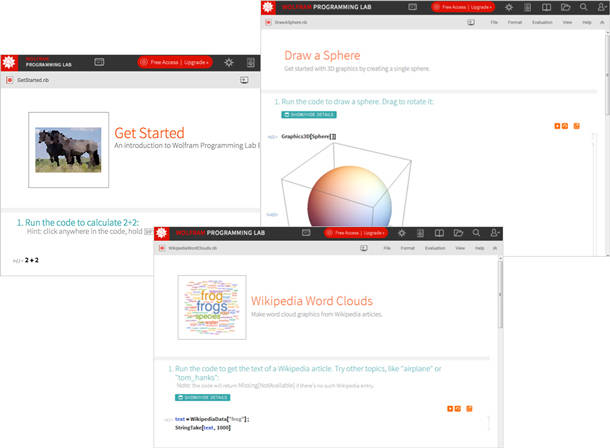| Free Wolfram Programming Lab And Book |
| Written by MIke James | |||
| Thursday, 17 December 2015 | |||
|
Wolfram has high hopes for its programming language and it is doing a lot to get attract attention to it. The real question is, will it go the final mile that is obviously needed to make it live beyond its current narrow confines.
Everyone seems to be impressed that Apple finally open sourced Swift and it has to be said that this succeeded in generating a lot of fresh interest in an otherwise unremarkable language. It seems that going open source, assuming you didn't start out open source is something that companies are beginning to understand is essential to the success of a language. However, Wolfram Language is very very definitely closed source and proprietary. Wolfram Language was really just the scripting language of Mathematica until suddenly Wolfram woke up to the fact that presented it as a separate entity it could somehow transcend the status of a proprietary math package. The language itself is mostly unremarkable - a mix of list processing with optional functional and object-oriented programming features. You can write a Wolfram Language program using almost any paradigm you care to pick. It also features term rewriting which gives it the self modifying power of Lisp like languages. However when you are using Mathematica it isn't really the quality of the language that attracts, it is the range of functions available.
What makes Wolfram Language powerful is that if you want to solve an equation you simply use the solve function. If you want to do a Fourier Transform then there is an FFT function. If you want to do a Principle Components analysis then use the PCA function and so on. The language is chock full of big sophisticated functions that you can use to do big sophisticated things in just one or two function calls. This is what makes Wolfram programs look so terse and hence efficient.
Wolfram offered the facilities of Mathematica as embodied in Wolfram Language on the web last year, but there wasn't a free tier. Now we have Wolfram Programming Lab which is a collection of workbooks that provide step-by-step guides to creating programs. Most of them focus on creating tiny programs that call a small number of hugely powerful functions.
More important than the learning features, there is now a free tier, allowing limited access to Wolfram Language, aka Mathmatica. If you sign up you get unlimited access of the lab workbooks and you can create five workbooks of your own. You can also deploy your programs, although they only remain live for 30 days. The service is also funded by advertising. If you want more than you will have to pay $10 a month for unlimited workbooks and no advertising. There are more expensive tiers with additional options.
At the same time Stephen Wolfram’s new book An Elementary Introduction to the Wolfram Language has been added to the lab. This is a book that aims to introduce programming to everyone: The goal of the book is to take people from zero to the point where they know enough about the Wolfram Language that they can routinely use it to create programs for things they want to do. And when I say “zero”, I really mean “zero”. This is a book for everyone. It doesn’t assume any knowledge of programming, or math (beyond basic arithmetic), or anything else. It just starts from scratch and explains things. I’ve tried to make it appropriate for both adults and kids. I think it’ll work for typical kids aged about 12 and up. If you take a look at it and you understand what programming is then you will quickly conclude that this doesn't to the job. Right from the start the basic idea is to use predefined functions to to amazing things. There is no attempt to teach programming at all! It is as if I said "now let's see how to sort some numbers into order - well all you have to do is use the Sort[list] function". If you are trying to learn to program or more likely trying to teach some one to program give this a big miss. The same is probably true of the Wolfram Language as well. It might be initially attractive as a first language because of how much you can achieve in a single command, but this really isn't what you are trying to teach. The new lab does provide a free way for you to use Wolfram Language and hence Mathematica. The other free option is to buy a Raspberry Pi and use the free version included in Raspian, but this can be slow. It is good that Wolfram Language is now available to all, but it would be so much more convincing if the source code?/was also available to all. Without this how can you trust your work to a proprietary language?
More InformationWolfram Programming Lab Now Available in Beta An Elementary Introduction to the Wolfram Language Related ArticlesMathematica 10 Now On Raspberry Pi Buy A Pi For $25 And Get Mathematica Free Raspberry Pi To Star In Class? Wolfram Language Cloud Launched Wolfram Language The Key To The Future? What To Call A Language - Mathematica Has a Problem
To be informed about new articles on I Programmer, sign up for our weekly newsletter, subscribe to the RSS feed and follow us on, Twitter, Facebook, Google+ or Linkedin.
Comments
or email your comment to: comments@i-programmer.info
|
|||
| Last Updated ( Thursday, 17 December 2015 ) |




